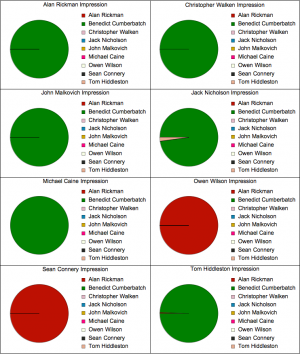December 2, 2014 weblog
Name that voice: Mathematica catches impersonations

Benedict Cumberbatch was recently invited to show off his voice impersonations of celebrities, from Christopher Walken to Taylor Swift. That video evidently inspired Wolfram's Rita Crook, marketing products manager, to ask that, if his impersonation skills of well-known talents such as Michael Caine could fool a listening human ear into thinking it was Michael, could the actor also fool a computer—-namely, could he fool Mathematica's machine-learning capabilities?
In the spirit of recent events, where Cumberbatch plays Alan Turing in "The Imitation Game," she raised the question into an imitation-test event, where Mathematica's capabilities were showcased with sample voice snippets for examination. "Is my psyche just being fooled by the meta-language, perhaps?" she posed. "If we take the data of pure voices, does he actually cut the mustard in matching these?" Crook said that "We built a path to each person's snippet database, which Mathematica exported for analysis." (Ten years ago, she reflected, "we would have needed to stroll the streets and play audio snippets to 300 people from the James Bond movies, The Shining, Batman, and Cumberbatch's impression snippets—then survey whether those people were fooled.") So the challenge boiled down to a database of voice samples and snippets from each of Cumberbatch's impression attempts. Mathematica was unleashed to demonstrate its abilities.
People on the list were John Malcovich, Alan Rickman, Christopher Walken, Michael Caine, Jack Nicholson, Sean Connery and Tom Hiddleston. The more data used, the more reliable the results, she said. Also, the snippets needed to be as clean as possible in that there would not be laughter, music, or chatter in the background. Of a total of 560 snippets, each had the same length, of 3.00 seconds.
Results: machine learning could mostly tell the difference between the actors' real voices and the impressions. In six out of the eight impressions tested, Mathematica guessed with more than 99.8 percent confidence that the speaker was Cumberbatch. Interestingly, when the machine heard Cumberbatch doing impressions of Sean Connery and Owen Wilson, the computer identified the voice as Alan Rickman. "It might be worth noting," she wrote, "that Rickman, Connery, and Wilson all have a slow rhythm to their speech, with many pauses (especially noticeable in the snippets I used), which could have confused the algorithm."
Wolfram is the software company behind the powerful Mathematica software used by scientists around the world and the company's original flagship product. In 2009, building on the Wolfram Language, they introduced Wolfram|Alpha—moving on to the web. The company said Wolfram|Alpha is "used by millions of people every day on the web, through mobile apps and intelligent assistants, and in enterprise deployments."
More information: blog.wolfram.com/2014/11/26/be … -he-fool-a-computer/
© 2014 Tech Xplore



















